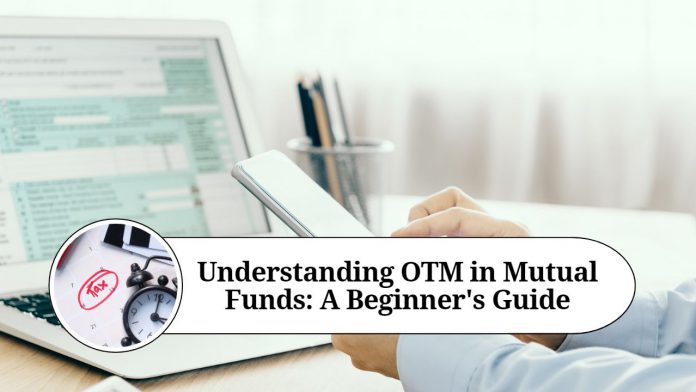If you are new to the world of investing, terms like OTM (Out of the Money) may sound like jargon to you. However, it is crucial to understand these concepts to make informed investment decisions. In this blog, we will explain what OTM means in mutual funds and how it impacts your investment.
What is OTM in Mutual Funds?
OTM or Out of the Money is a term used to describe the position of an option contract in the stock market. In mutual funds, it refers to the situation where the current market price of the underlying asset is lower than the strike price of the option contract.
In simple terms, if you hold an option contract that has a strike price higher than the current market price of the asset, it is considered an OTM option. For example, let’s say you buy a call option on a mutual fund with a strike price of $50, but the current market price of the fund is $40. In this case, your option contract is OTM.
Impact of OTM on Mutual Fund Investments
The value of an OTM option contract in mutual funds is determined by the difference between the strike price and the current market price of the underlying asset. Since the option is OTM, it has no intrinsic value, and its value is purely based on the probability of the market price of the underlying asset moving towards or crossing the strike price before the option contract’s expiration date.
In other words, the closer the current market price of the underlying asset is to the strike price of the OTM option contract, the higher the probability of it becoming profitable. However, if the market price of the asset does not move as expected, the option contract will expire worthless, and the investor will lose their investment.
In mutual funds, OTM options are usually used for hedging or speculative purposes. Hedging involves using options to protect your investment against market volatility, while speculating involves trying to profit from the price movements of the underlying asset.
Final Thoughts
OTM is an essential concept to understand in mutual funds as it can impact your investment returns. If you are new to investing, it is advisable to consult a financial advisor or do your research before investing in mutual funds with OTM options. Always remember that investing involves risks, and it is crucial to have a clear understanding of the terms and conditions before making any investment decisions.
Read more useful content:
- How to invest in mutual funds
- Best Technology Mutual Funds
- All about mutual funds-types & importance
- The Power of SIP Investment in Mutual Funds
Frequently Asked Questions (FAQs)
Q. What does OTM mean in mutual funds?
OTM stands for “Out of the Money.” In mutual funds, it refers to an option contract that has a strike price higher than the current market price of the underlying asset.
Q. How does an OTM option work in mutual funds?
The value of an OTM option in mutual funds is based on the probability of the market price of the underlying asset moving towards or crossing the strike price before the option contract’s expiration date. If the market price does not move as expected, the option contract will expire worthless, and the investor will lose their investment.
Q. What is the difference between an OTM option and an ITM (In the Money) option?
In mutual funds, an ITM option has a strike price lower than the current market price of the underlying asset, while an OTM option has a strike price higher than the current market price.
Q. Why do mutual funds use OTM options?
OTM options are commonly used in mutual funds for hedging or speculative purposes. Hedging involves using options to protect your investment against market volatility, while speculating involves trying to profit from the price movements of the underlying asset.
Q. Are OTM options in mutual funds high-risk investments?
Yes, investing in mutual funds with OTM options can be considered high-risk as the option contract may expire worthless, resulting in a loss of investment. It is important to understand the risks involved before investing in such funds.
Q. Can investors buy or sell OTM options in mutual funds?
Yes, investors can buy or sell OTM options in mutual funds, but it is important to understand the risks involved and consult a financial advisor before making any investment decisions.
Q. Can OTM options in mutual funds be profitable?
OTM options in mutual funds can be profitable if the market price of the underlying asset moves towards or crosses the strike price before the option contract’s expiration date. However, there is no guarantee of profit, and the option contract may expire worthless, resulting in a loss of investment.




















